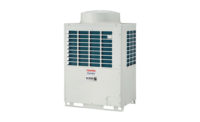
The installation of intake filters eliminated sludge build-up, which in turn prevented strainer and/or blowdown valve clogging that had occurred in this hospital’s cooling tower systems. Additionally, the installation allowed the facility to cut its chemical consumption by over 50% and reduce its makeup water consumption by 35%.
Several modern medical buildings housing the corporate offices of Baptist Healthcare System as well as physician offices and other health service facilities next to Baptist Hospital East (BHE), of Louisville, KY, had experienced cooling tower problems over the last decade and a half.
Managing the cooling of the buildings had been a challenge due to ongoing maintenance problems presented by two cooling towers. Gilbert Fister, properties manager for BHE’s campus buildings, was faced with taking the towers out of operation for scheduled maintenance twice a year, plus, due to the high seasonal concentration of airborne contaminants that got drawn into the towers, they required unscheduled maintenance associated with system fouling and clogging.
“In the spring and summer, mayflies, pine needles, and other matter would seriously clog our fill material and basin strainers and trigger a series of other operational problems,” said Fister.
When Organic Isn't Good
Although the cooling towers are equipped with water filtration systems, they required weekly monitoring and cleaning and did little to protect debris from getting into the cooling water in the first place. Further, they did nothing to protect the fill material from getting clogged with the debris being drawn in, resulting in a reduction of thermal efficiency as the cooling water passed through the fill material.Additionally, organic debris (insects, pine needles, cottonwood seed, leaves, dirt, and other airborne matter) would collect in the basin and decompose, resulting in sludge build-up that supported bacteria proliferation, plugged the basin strainers, and reduced cooling efficiency when circulated through the chiller. On many occasions, debris got through the basin strainer, resulting in the solenoid blowdown valve getting stuck in the open position. That triggered automatic release of water treatment chemicals and prematurely drained the treatment chemical tank requiring BHE to call for emergency refills.
Furthermore, when the blowdown valve stuck in the open position, it resulted in the loss of thousands of gallons of makeup water because the sump would not retain the water. In short, the system would fail.
During scheduled maintenance, the towers were routinely cleaned using a pressure washer and cleaning solvents - much of the work was focused on cleaning the fill material, which had high debris concentrations of its surface. Over the course of a year, literally thousands of dollars were spent on just keeping the cooling towers operationally and ecologically sound. Gilbert was not satisfied with the situation and set out to improve the maintenance demands.
While consulting with his maintenance contractor, Gilbert realized that they needed a solution that would prevent debris from getting into the cooling towers in the first place. Gilbert contacted Air Solution Company, which manufactures air intake filters that mount to the outside of the intake opening and are specifically designed to isolate the airborne debris on the outside of the cooling tower.
Sludge No More
Since the installation of Air Solution’s Air Intake Filters, BHE staff reports that the sludge build-up has been eliminated, and they haven’t experienced any strainer or blow-down valve clogging. Furthermore, they have reduced their chemical consumption by over 50% and reduced their makeup water consumption by 35%. Because Air Intake Filters now keep debris out of the system, BHE staff hasn’t required unscheduled service due to system fouling - saving thousands of dollars in labor and service cost.“Since the installation, we now only inspect our towers monthly and find little or no maintenance required, versus our inspecting them weekly before the filters were installed and nearly every time finding a need for some maintenance work,” Fister said. “Installing the filters on our cooling towers has saved us countless dollars and has given me peace of mind knowing that we’re now optimizing our operational efficiency and protecting the core of our cooling systems.”ES








